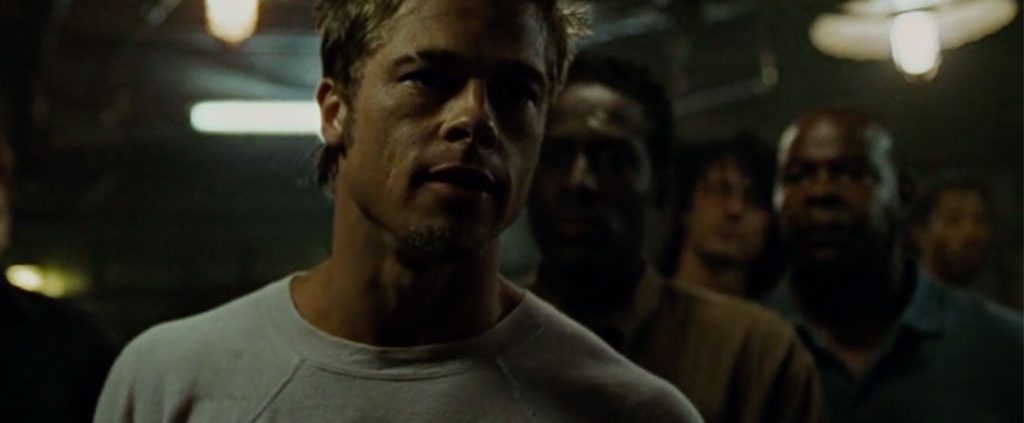Fight Club and the Emptiness of Our Human Pursuits
“Mischief. Mayhem. Soap.” That is the tagline of Fight Club, one of the most popular and often-quoted films of the 1990s. With a rating of 8.8/10 on IMDB, the film officially cemented Brad Pitt’s character, Tyler Durden, as a symbol of anti-establishment in modern-day America. Fight Club is based on the 1996 book written by Chuck Palahniuk, and has attained a cult following after the film was released in 1999.
Fight Club tells the story of a nameless narrator (Edward Norton) who suffers from insomnia. When his doctor has no cure for him, he joins cancer support groups in order to find therapeutic release. The narrator works in compliance for an auto company and during a work trip, meets Tyler Durden (Brad Pitt) on the plane. When the narrator loses his home, he moves in with Tyler and the two form an underground fighting club.
Fight Club has remained popular even today because it highlights three very pertinent issues that continue to affect our society—the pursuit of materialism as a path to happiness; the definition of masculinity and what it means to be male; and the rise of mental health issues among seemingly ordinary people.
1) Materialism—“The things you own end up owning you”
Fight Club is essentially a critique on modern life and our endless pursuit of material things. Despite having a secure job and a 15th-floor apartment, the narrator is constantly unhappy, leading him to suffer from insomnia and other illnesses. When his home catches fire, he says: “That condo was my life, okay? I loved every stick of furniture in that place. That was not just a bunch of stuff that got destroyed, it was me!” His security and identity have been so intricately tied to his possessions—sofa units, glass dishes and stereo sets—that he felt incomplete without them.
His friend, Tyler, however, has a different point of view. “You’re not your job. You’re not how much money you have in the bank. You’re not the car you drive. You’re not the contents of your wallet,” he says. Tyler is right in a sense. The Bible tells us not to “store up treasures on earth, where moth and rust destroy and where thieves break in and steal” (Matthew 6:19). But while Tyler’s solution—starting Fight Club—leads to chaos, God’s solution is that we become securely rooted in His unconditional love, so that we will not be shaken to the core when stripped of material things.
2. Masculinity—“We are a generation of men raised by women”
Fight Club deals with masculinity from a very disenchanted and disillusioned point of view. The movie implies that absent male figures are the reason for spiritual and societal breakdown. “Our fathers were our models for God. If our fathers bailed, what does that tell you about God?” asks Tyler. His solution, and his salvation, is in an organisation like Fight Club which enables men to vent their frustrations against societal expectations, feel alive and find purpose again.
Just like femininity, much is debated on the concept of masculinity. What makes a man a man, what does it mean to be a man, and who is a good male role model? The film doesn’t provide answers, but it certainly questions the image of masculinity that is presented to men today. In one scene, the narrator observes an underwear ad on a bus and asks Tyler, “Is that what a real man is supposed to look like?” In the Bible, Jesus is the role model for manhood. He is a servant, leader, provider and protector, who loves and sacrifices himself for the Church just as a husband should do for his wife (Ephesians 5:23).
3. Mental Health—“Our Great Depression is our lives”
Fight Club was written at a time when digital technology was not yet as advanced, when life should have been less complicated without the isolating effects of today’s fast-paced and on-demand world. But the plot twist at the end reveals that the main character suffers from more than just insomnia and disillusion. He is in fact experiencing personality disorders and schizophrenia. At the same time, his underground fight club has moved out of the basement and evolved into nationwide acts of terrorism.
The movie is not an extreme example of what could go wrong in our lives if we live without God. If we take matters into our own hands, we will end up with the kind of devastation seen in this film. Our narrator—due to his unhappiness and disillusion—ends up spiraling into mental (internal) and physical (external) destruction. Thankfully, God has a solution to this world’s problems. Jesus says in John 6:35 (ESV): “I am the bread of life; whoever comes to me shall not hunger, and whoever believes in me shall never thirst.” Only God can truly satisfy us, because our wealth, health, human relationships, and achievements will ultimately pass away.
Fight Club is not just a movie about being Brad Pitt cool. People have come to love this film for its message to the modern world—that buying things will not make us happy, that living up to advertising standards of what manliness looks like is not how we should be defined, and that if we are not careful, the pressures of modern life will first break our minds before it starts to break us on the outside. May we always be reminded that our hope is not in ourselves nor in this temporal world, but in an eternal one.
Whoever drinks of the water that I shall give him will never thirst. (John 4:14, ESV)











Leave a Reply
Want to join the discussion?Feel free to contribute!